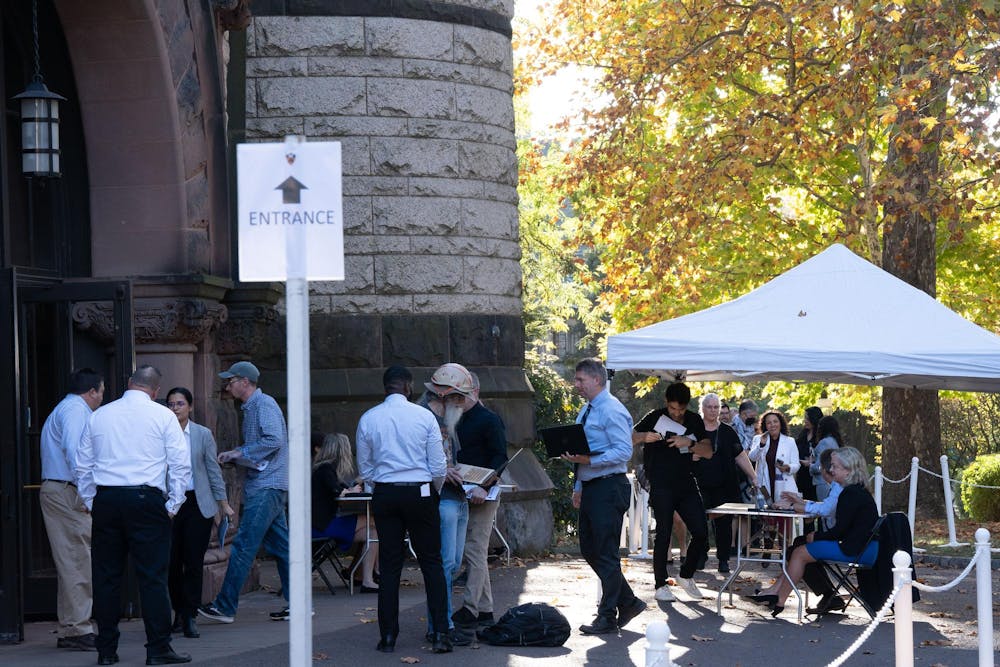Following procedural debate, faculty voted with a razor-thin margin to postpone voting on controversial proposals and to form an ad-hoc committee to research faculty-wide statements at the highly-anticipated Oct. 21 faculty meeting. The motion passed 166-156-7, a number corroborated by professors present.
The meeting’s events were largely dictated by a group of six elected tenure-track faculty, the Faculty Advisory Committee on Policy (FACP). At the start of the meeting, they proposed a motion to postpone all agenda items until the meeting scheduled for April 28, 2025, and also unanimously voted to close the meeting to the public, including the press.
According to a report attached to the meeting agenda obtained by The Daily Princetonian, this was done to encourage faculty to speak freely and to simplify procedures “so that more time can be devoted to debate motions, if necessary.” According to the faculty in the room, little debate took place, and the meeting lasted just an hour.
Two opposing camps of professors planned to push through votes on their respective agenda items. One faculty coalition hoped to advocate for pro-Palestine causes, while the other sought to impose neutrality from the faculty on political statements.
“The faculty neutrality people were opposed to postponement,” Math professor Peter Ozsváth GS ’94 — who identified as a part of the group — told the ‘Prince.’
According to Ozsváth, University President Christopher Eisgruber ’83 shared that he was in favor of postponing the meeting, along with other administrators.
“There was a lot of administrative support for postponement,” he added. “And I think the activists were also in favor of postponement because they saw that they were going to lose,” he said, referring to the faculty members in support of the pro-Palestine measures.
The postponed items include two measures directly related to pro-Palestine protests on campus, both proposed by Classics professor Dan-el Padilla Peralta ’06 on behalf of 20 other faculty members.

The ‘Prince’ was unable to reach Padilla Peralta and his fellow signatories by the time of publication.
Their proposals call for the creation of an ad-hoc committee to review the University’s response to protest in Spring 2024 and the establishment of an initiative to support Palestinian, Arab, and Arab-American University community members.
His first proposal also requested that the meeting be opened to the campus press “in view of the potential significance of these proposals for members of our University community,” and urged the FACP “not vote to close the meeting to them.”
Padilla Peralta was one of the professors who entered Clio Hall with protesters during the April 29 sit-in but left shortly after it began. In an Oct. 16 memo obtained by the ‘Prince,’ Vice President and General Counsel Ramona E. Romero advised that Padilla Peralta’s proposals may overstep faculty authority and should be revised prior to consideration.

The other postponed measure, proposed by Politics and School of Public and International Affairs (SPIA) professor Jonathan Mummolo, sought to amend Section II.C.2 of the Rules and Procedures of the Faculty to prevent faculty-wide political statements.
Mummolo co-chairs the newly-created Council on Academic Freedom, whose members have voiced disapproval towards faculty-wide political statements and support institutional neutrality. Operations Research and Financial Engineering (ORFE) professor Matias Cattaneo, one of six members of the FACP, is also a member of the Council.
The FACP report, “Assessing Proposed Measures Related to University Disciplinary Proceedings and the War in the Middle East, and to Amend Section II.C.2 of the Rules and Procedures of the Faculty,” addressed six pro-Palestine proposals initially put forward at the May 8 special faculty meeting held during the “Gaza Solidarity Encampment.”
However, the May meeting only addressed one of the proposals regarding “the granting of amnesty to students and other university affiliates involved in peaceful free speech and assembly for justice in Palestine,” including the encampment, sit-in, and hunger strike. The proposal was drafted by professors Molly Greene GS ’93, Ruha Benjamin, Dan-El Padilla Peralta ’06, Lidal Dror, V. Mitch McEwen, and Curtis Deutsch.
The sole meeting agenda addressed was a recommendation from FACP to form a faculty ad-hoc committee to “research faculty-wide statements” on political issues and create a process for faculty feedback similar to the Council of the Princeton University Community’s (CPUC) Resources Committee. The FACP suggested the report be released by April 1, 2025.
According to an email obtained by the ‘Prince’ from Dean of the Faculty Gene Jarrett, due to the high volume of faculty interested in attending, the meeting was moved to Richardson Auditorium in Alexander Hall, and faculty proxes were checked at the door. Approximately 300 faculty members attended.
Olivia Sanchez is an associate News editor for the ‘Prince.’ She is from New Jersey and often covers the graduate school and academic departments
Please send any corrections to corrections[at]dailyprincetonian.com.








